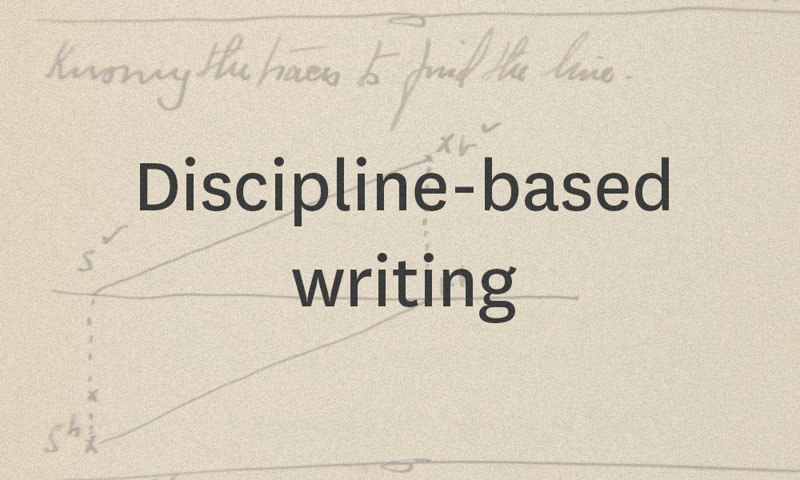Rosemary Wette from the Applied Language Studies and Linguistics department at the University of Auckland’s Faculty of Arts originally developed the project resources with arts students in mind. Research for the project was carried out throughout 2017, in collaboration with Jennifer Frost from Department of History.
These resources might be useful to: teachers of discipline-specific writing to undergraduate students (especially in Arts).
The project was supported by the SEED Fund grants for 2017 and the CLeaR Fellowship programme.
Watch Rosemary present her project at the 2017 CLeaR Teaching and Learning Symposium here. You can also watch an interview with Rosemary here.
For similar projects, see: Student writing textbank and Encouraging Collaborative Writing via Google Docs Analytics.

Project background
Objectives
The aims of my CLeaR Fellowship project and SEED grant were to explore common core and disciplinary-specific elements in undergraduate writing in Arts subjects by learning about assignment requirements and staff views on proficient writing (Phase 1 of the project), and to then use this knowledge to develop and implement workshops on dissertation writing with BA Hons students in HISTORY 780, Dissertation course (Phase 2).
The main outcomes of the two phases
Phase 1: Transcriptions of seven interviews with lecturing staff in Arts on their views on proficient writing in Arts. These revealed that in order to be evaluated as proficient, texts by undergraduate writers need to demonstrate:
- an understanding of course themes,
- appropriate use of scholarly sources,
- engagement with assignment topic through critical analysis/argument,
- use of evidence and examples in support of appropriate claims,
- coherent organisation,
- use of appropriate transitions and signposting,
- well-structured sentences and paragraphs,
- and grammatical and lexical accuracy.
I also learned from the interviews about the support routinely offered to undergraduate students from within their disciplinary courses, which includes detailed assignment task sheets and marking rubrics, in-class explanations and opportunities to discuss models, scaffolded tasks, and opportunities to receive feedback from peers and teachers on drafts and marked assignments. Phase 2: From analysis of dissertations, examination of literature on historical discourse, discussions with History lecturers and attendance at workshop sessions I developed two 2-hour workshops within the course HISTORY 780 for BA Hons students. These examined dissertation features; the structure of core components e.g. Introduction, Historiography, Methodology, Argument, and Conclusion; time, causality and argument; and the use of metadiscourse to manage the information flow and engage with readers.
Project reflection
Contribution to students’ learning
Two groups of students are likely to have benefited/benefit from the project. The first is the cohort of BA Hons dissertation students taking HISTORY 780. Feedback from students (both informally and through written comments) and from the course convenor (Dr Joe Zizek) noted the usefulness of my examination of dissertation components, and for the opportunities I provided for analysis of the discourse of sample dissertations and published texts. Both workshop sessions were very well attended. The second group will be the cohorts of postgraduate (PG Dip., Masters and doctoral) students from a variety of disciplines who enrol in LANGTCHG 715, Developing Academic Literacies course. I intend to incorporate what I have learned from the project into future revisions of materials and instructional tasks for this course.
Contribution to own learning
The project has benefitted my understanding of disciplinary discourses hugely. I have already been able to draw on this knowledge to complete an invited book review for a high-ranking (30/182 in Linguistics) international journal: “Discipline-specific writing: Theory into practice,” J. Flowerdew & T. Costley, Eds., 2017 in the Journal of English for Academic Purposes 29, 59-61, https://doi.org/10.1016/j.jeap.2017.08.003.
Future plans
I intend to draw on my learning from the project to prepare publications from a study of discipline-specific literacy needs and support at Stage 1 for Population Health students (data collection is now complete), and a study of the academic discourse socialisation challenges and coping strategies of international graduate students entering English-medium universities (article currently in preparation). I will also draw on my learning in future explorations of common core and disciplinary components of proficient academic writing.